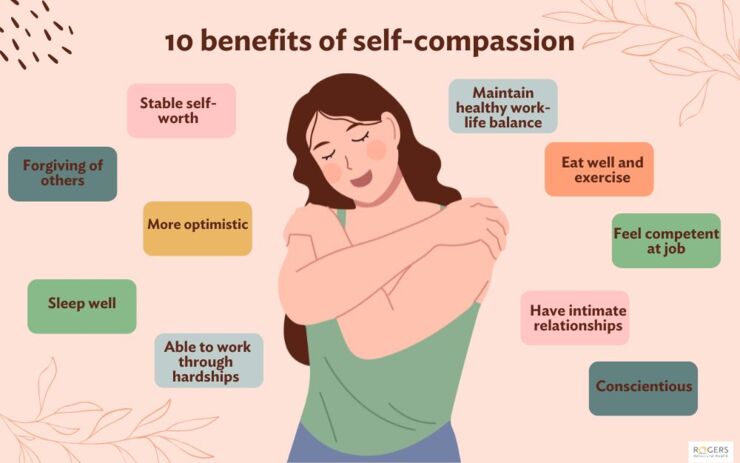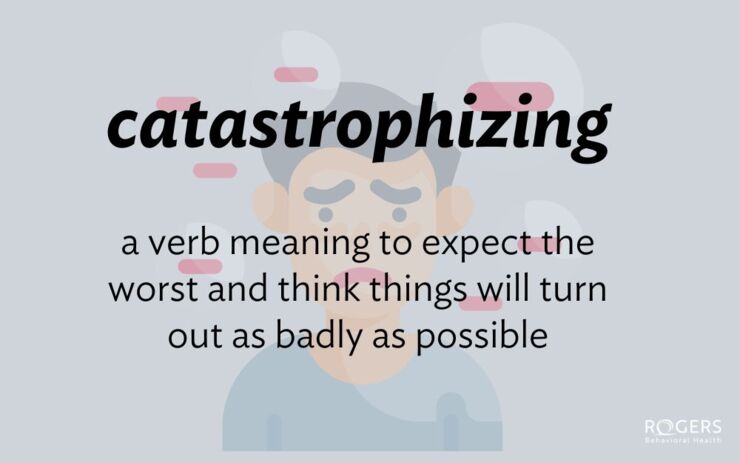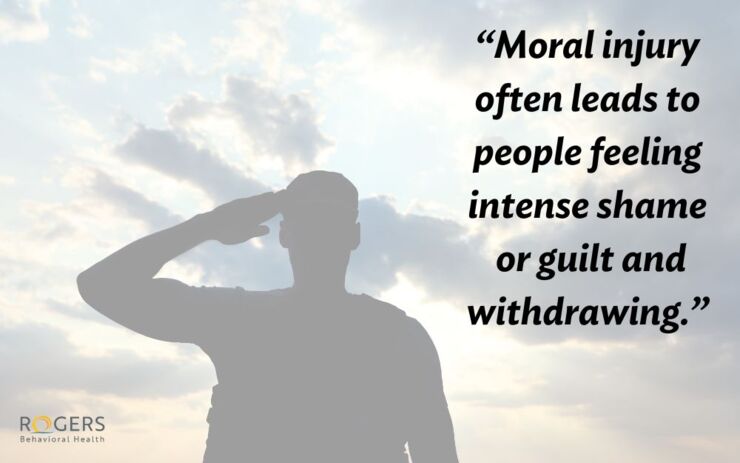Self-compassion: Benefits and ways to practice
Posted on 06/17/24 01:00:pm
Share this article:
By Hanna Maechtle, training lead, Community Learning and Engagement, Rogers Behavioral Health
Definition of self-compassion
When we show compassion to a friend, loved one, or colleague, we are present enough to notice their struggle; realize that suffering, failure, and imperfection are part of the shared human experience; and respond with kindness, care, and understanding. Dr. Kristin Neff, a pioneer in the study of self-compassion, says when we have self-compassion, we respond to ourselves in the same way that we respond to others.
Self-compassion means letting go of the idea of toughing it out or getting lost in negative thoughts. Instead, we ask ourselves, “What do I need in this moment?” Self-compassion means that we’re kind and understanding when confronting our failings. After all, who ever said we were supposed to be perfect?
Self-compassion benefits
Self-compassion is important for people to learn, grow, and get comfortable being uncomfortable. Research shows that self-compassionate people are more likely to experience many physical, emotional, and social benefits, including:
- Feeling happy, optimistic, and satisfied with their lives
- Having a stable sense of self-worth
- Showing grit, motivation, and determination to meet important goals and work through hardship
- Forgiving others and being compassionate
- Maintaining a healthy work-life balance
- Eating nutritious food, exercising, and getting regular medical checkups
- Sleeping well and having a strong immune system
- Coping with work challenges and feeling more competent and effective at their jobs
- Experiencing intimacy in relationships
- Being conscientious and taking personal responsibility
Is self-compassion selfish?
The short answer to the question of whether self-compassion is selfish is absolutely not. The more compassion we’re able to give ourselves, the more we’re able to give others. This just isn’t supported by the old saying of you can’t love someone else until you love yourself. Research shows that self-compassionate people are able to be more supportive and caring to the people in their lives. Additionally, professional and family caregivers are able to care for others without becoming drained or burned out.
Self-compassion exercises
Three ways we can practice self-compassion are:
- Try positive self-talk when we feel we’ve fallen short. Reflect on the lessons learned rather than actions missed. Remind ourselves that we’re not alone in our feelings. We’re not the only person who has fallen short, and we never will be.
- Take comfort in knowing that the experience of suffering is an experience of being human.
- Allow ourselves to experience emotions without judgement. Rather than reacting to, or overidentifying with our emotions, take a more balanced approach that neither suppresses the emotions nor exaggerates them. Realize emotions are not permanent, and even challenging ones will pass. We can ask ourselves how we would treat a friend in that moment. Journaling and reflection can allow space for honest practice.
The Compassion Resilience Toolkit, developed in partnership with Rogers, offers the following script for a self-compassion break: “May I give myself the space and time to feel my difficult emotions when I believe I have not measured up. May I be gentle with myself and recognize that all humans are imperfect, including me. May I remember that I am not alone, I am part of humanity. May I speak to myself with the kindness I would to others. May I begin to forgive myself for my actions or inactions. May I reach out to others for understanding and love when weighed down by shame.”
Research-backed guided self-compassion exercises include:
- https://self-compassion.org/self-compassion-practices/
- https://centerformsc.org/free-meditations-practices/
- https://chrisgermer.com/meditations/
How does Rogers help patients with self-compassion?
Seeking out support for one’s mental health is self-compassion. Recovery isn’t linear, and there are plenty of opportunities to practice it along the way. The natural and supportive community that’s part of mental health and addiction treatment at Rogers is empowering, and often relieving. Additionally, it’s a crucial experience of self-compassion. Oftentimes, for the first time in their lives, people are exposed to others who suffer in a very similar way as themselves.
Mental health and addiction treatment at Rogers
Rogers offers compassionate care for people struggling with OCD and anxiety, eating disorders, depression and other mood disorders, and addiction. Call 800-767-4411 for a free, confidential screening.



